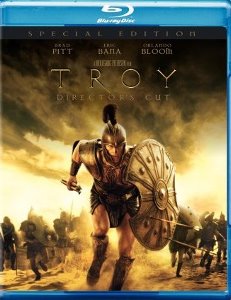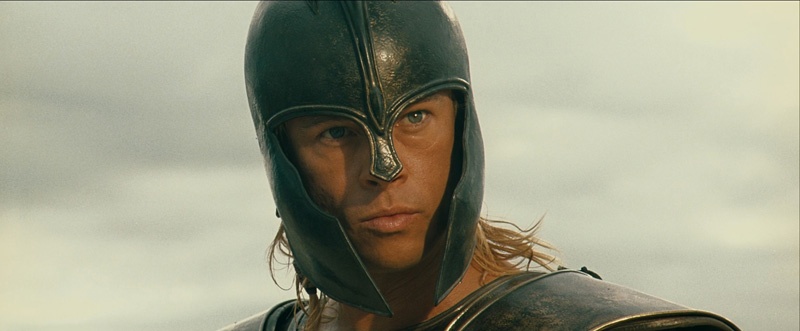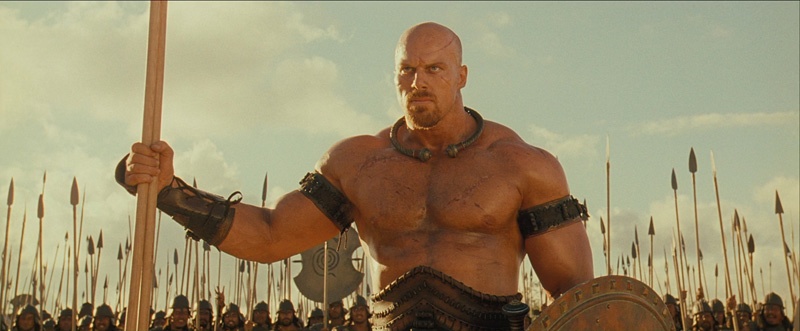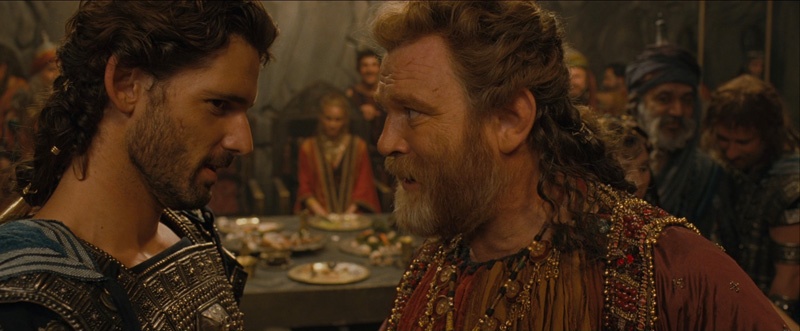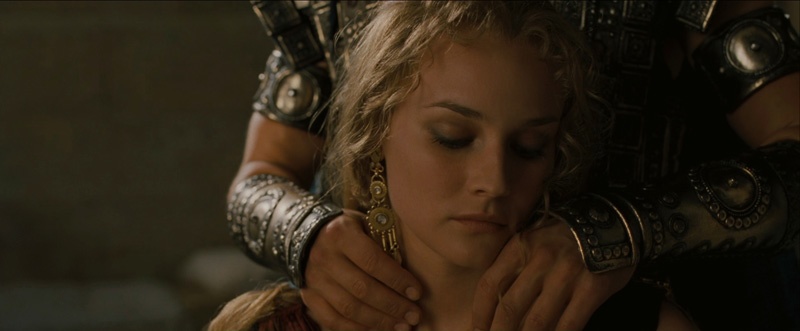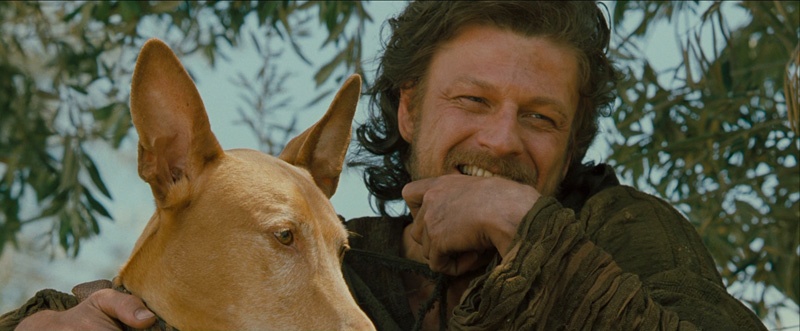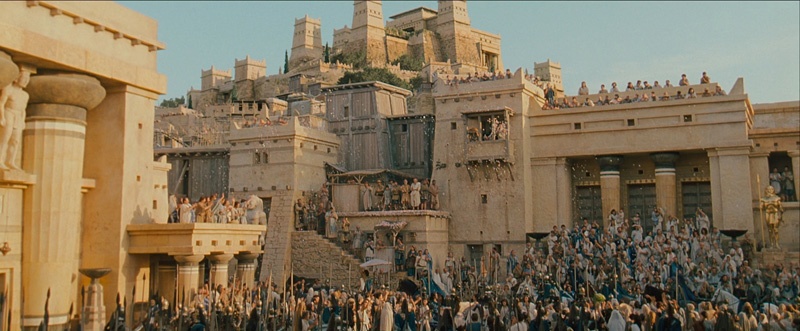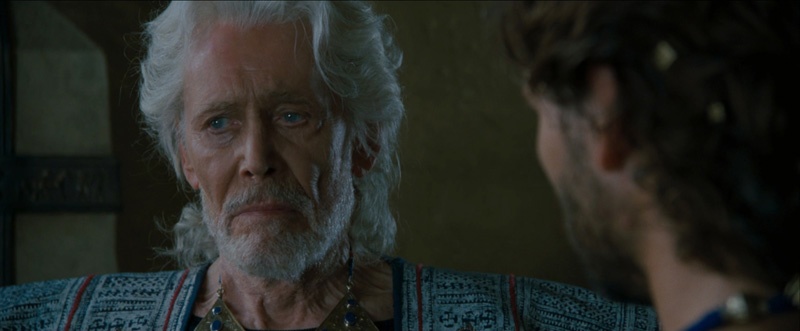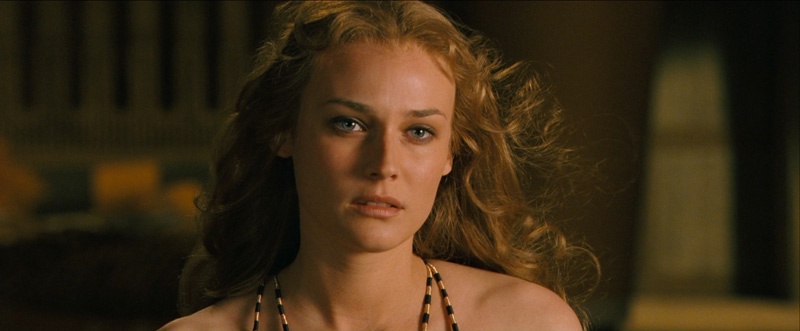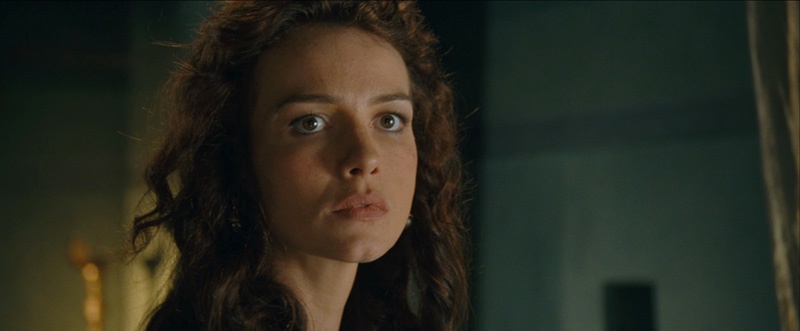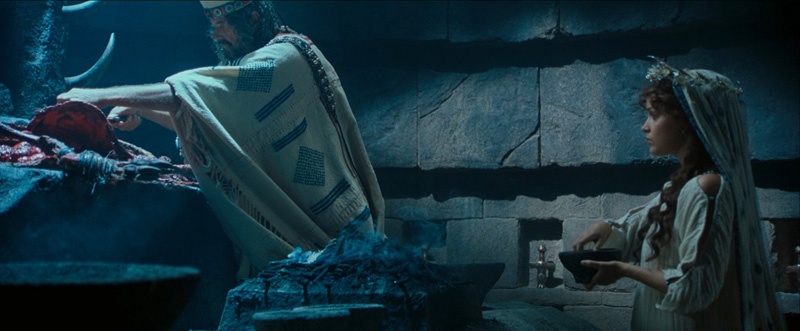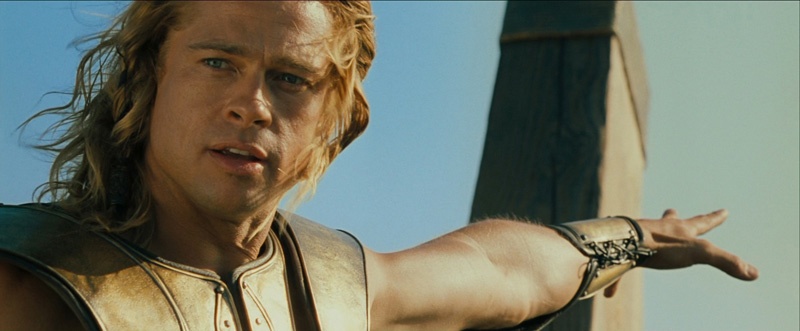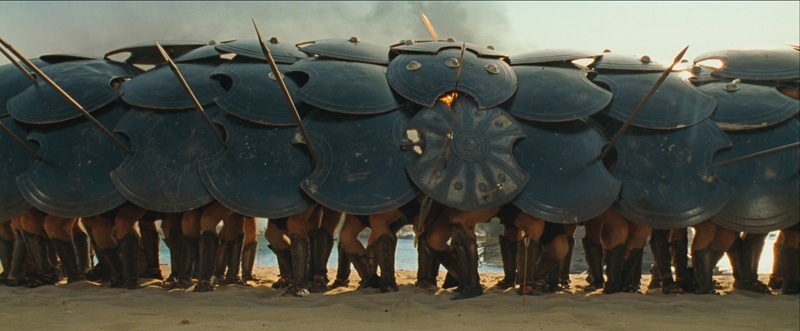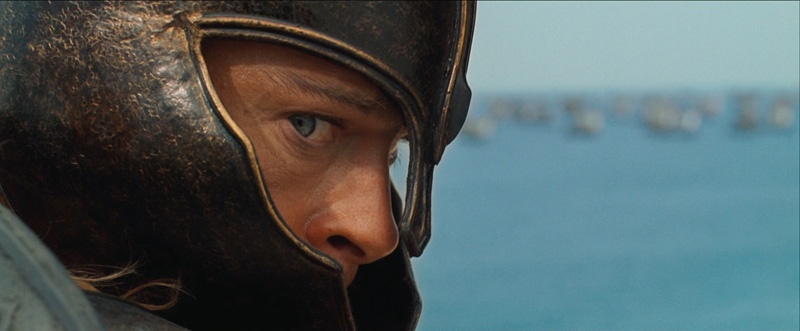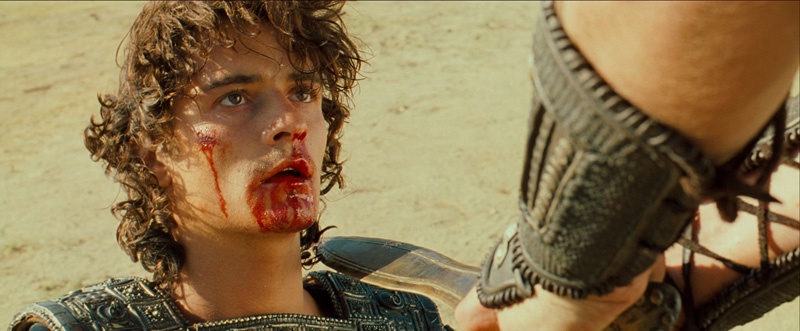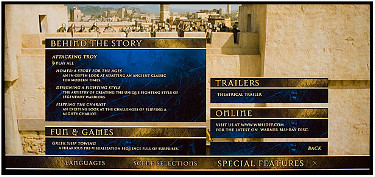Troy (Director's Cut) BRD
(Wolfgang Petersen - 2004 / 2007)
Studio: Warner, UK/Malta & Helena Ltd / Warner Home Entertainment (USA)
Disc:
Region: FREE! (as verified by the Momitsu region FREE Blu-ray player)
Runtime: 3:16:02.792
Disc Size: 32,081,649,396 bytes
Feature Size: 27,714,471,936 bytes
Video Bitrate: 11.77 Mbps
Chapters: 46
Case: Standard Blu-ray case
Release date: September 18th, 2007
Video:
Aspect ratio: 2.39:1
Resolution: 1080p / 23.976 fps
Video codec: VC-1 Video
Audio:
LPCM Audio English 4608 kbps 5.1 / 48 kHz / 4608 kbps / 16-bit
Dolby Digital Audio English 448 kbps 5.1 / 48 kHz / 448 kbps
Dolby Digital Audio French 448 kbps 5.1 / 48 kHz / 448 kbps
Dolby Digital Audio Spanish 448 kbps 5.1 / 48 kHz / 448 kbps
Subtitles:
English, French, Spanish, Chinese, Korean, Portuguese, none
Extras
Making-of Featurettes:
• Troy Revisited: An Introduction by Wolfgang Petersen
• Troy in Focus
• In the Thick of Battle
• From Ruins to Reality
• Troy in Focus
• Troy: An Effects Odyssey
• Attacking Troy
• Theatrical trailer
Troy: Director's Cut ~ Comment
This edition of Troy, like Warner’s Blu-ray release of Alexander
Revisited, is a re-cut of the original film (released on
HD-DVD by Warner a year earlier.) In this case, adding some
30 minutes, some of it fleshing out, so to speak, the
relationship of Helen and Paris and going some way to
explain the whys and wherefores of their fated fever. Also
included is more bickering between Achilles and Agamemnon,
which can only be a good thing. However, I could have done
without the extra gore and fake blood in the battle scenes.
All in all, though, the extra time is worth the price of
admission.
I enjoy this movie, either way, so the “Director's Cut”
worked out well for me and for the most part comes off well
in this Blu-ray edition. I’, not one of those who get all
worked up about the ways this story is unfaithful to Homer’s
version of events. 3000 years after the fact, it’s hard for
me to be concerned over discrepancies – even big ones such
as compressing a ten year war into what seems to be a couple
of weeks, or less big ones such as how Agamemnon meets his
maker. Unlike Oliver Stone’s Alexander, there appears to be
no historian looking over Petersen’s shoulder. But then,
unlike Stone’s film, the scale is more intimate, less epic,
less ambitious – and for all that, and despite that
shortening the war makes the events less credible in purely
dramatic terms, Troy is the much more satisfying of the two
– helped by a more subtle and even-handed script. When
Agamemnon says that Achilles "can't be controlled – he's
likely to fight us as the Trojans." Nestor replies, "We
don't need to control him, we need to unleash him."
More so than Alexander, I found the casting here to be
visually convincing, even if the line readings are all over
the map. I have to say, however, that I was not particularly
distressed by this – I'm not sure why. Perhaps I was aided
by having recently watched MGM's 1935 Midsummer Night's
Dream. Brad Pitt may be the Dick Powell of his time in this
regard, but I felt he looked and acted ever so much more the
warrior than Colin Farrell did a leader of men in Alexander.
My guess is that whatever you expect by seeing this movie,
you won't be disappointed. It certainly won't be Homer or
history. But you knew that, right? .
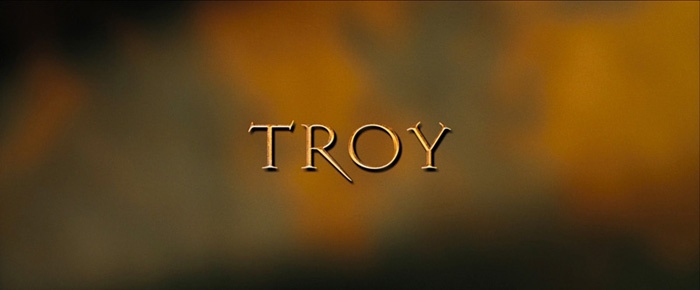 |
Troy: Director's Cut ~ The Score Card
The Movie : 7/8
NOTE: The below Blu-ray captures were taken directly from the Blu-ray disc.
Just as Agamemnon subdues the last of the Grecian kingdoms, his
brother, Manelaus, king of Sparta, implores him to attack
Troy to wrest his wife, Helen, from the clutches of the
youth, Paris, who has stolen her from under his very house.
Agamemnon's thirst for dominion is thereby kick-started by
Paris's brazen act, since undefeated Troy, which lies across
the sea, has always been outside of his grasp. Now he has
the excuse to rally all his armies to an attack. But for his
plan to succeed he requires the aid of Achilles and his
Myrmidons. Achilles, Agamemnon is always quick to point out,
fights for no king save his own heroic destiny, and so he
enlists the aid of Odysseus to persuade Achilles. Meanwhile,
Hector, Paris' older and wiser brother, reconsiders his
impulse to send Paris and Helen back to Sparta, knowing that
Paris would be skewered. Their father, Priam, king of Troy,
finds a way to support that decision with the help of his
generals and priests, all of whose names seem to be Hubris.
By the time Agamemnon's armies land at the shores of Troy,
it is clear to all concerned that this battle is no longer
about Helen.
Though hopelessly outnumbered, Troy puts up a valiant fight
with its insurmountable walls and smarter strategies of
defense. Achilles is about to return home before the fight
is ended when the Greeks are granted a fateful stroke of
tragic luck: Achilles' dearest friend (and, possibly,
lover), Patroclus, is killed by Hector, believing him to be
Achilles. (After all, the subtitle of Homer's epic poem is
"The Rage of Achilles.") The inevitable duel follows. Still,
Troy does not fall until the idea of the great wooden horse
is conceived. The rest, as they say, is history - or, at
least, legend.
But first, there is Brad Pitt, looking bronzed, beautiful
and athletic. Is it a stretch to say, godlike? His Achilles
is the complete narcissist – the supreme warrior with a
thousand-year stare into history. He may not be aware of his
demigod status, but he certainly knows he's a superhero.
When Pitt stirs his troops for their D-Day landing at Troy’s
beach, we sense echoes of Henry V. Destiny is the password.
One thing this movie is not about is Helen – you know, the
woman who launched a thousand ships. Well, this is not that
Helen. Ten ships, maybe. It's not that supermodel Diane
Kruger isn't drop-dead beautiful – and there is more of that
beauty to admire through Paris' eyes in this new Director's
Cut - but her beauty is embarrassingly superficial, if only
because she isn't actress enough to project it from within.
But this doesn't really matter, for its script and dramatis
personae are quite clear that this war is not about her.
[Reading my comment about Ms. Kruger’s Helen some three
years hence I cannot but marvel at the growth of this
actress since Troy. It’s hard to believe this is the same
Diane Kruger who plays the double agent in Tarentino’s
Inglourious Basterds. Thinking about a similar
transformation with Marilyn Monroe, I wonder if Diane can do
comedy?]
If you know who Eric Bana is, then you'll find him here as
well, looking all loyal in that quiet authority he does so
well. Bana was the soldier who comes out of nowhere in Black
Hawk Down to provide the necessary anchor to neophyte
Marines pinned down in a bewildering street fight in
Somalia. I felt he was less successful in Hulk, but so was
everything else about that movie. He has since found
himself, or perhaps I should say, lost himself properly in
Spielberg's Munich. (My guess is that Bana would have made a
more satisfactory Aragorn than Viggo Mortensen.) Here Bana
is Hector, and he could hardly be more different from
Achilles.
The confrontations between Hector and Achilles have drama
and destiny written all over them. The one-on-one fight
sequences are brilliant. Pitt has a great attack gambit,
leaping and whirling over his opponent's shoulder and
striking down through the neck into the main arteries. And
he does this twirling thing with his shield that serves to
rev up his engine as he moves in for the kill. Brilliant!
The big duel between Hector and Achilles doesn't disappoint
- though coming before the Horse, it turns out to be a
little anti-climactic.
It isn't so much that Orlando Bloom as Paris terrible, it’s
that Paris is such a wuss – or at least he is written as
such a self-serving adolescent that we would as soon Hector
throw him overboard the moment he learns of his brother’s
betrayal. Paris only goes downhill from there. On the other
hand, his being such a coward makes the irony of his
eventual murder of Achilles that much more tragic.
Agamemnon, played with zestful venom by Brian Cox, ruler of
just about all of what there was of Greece at the time, can
hardly stand it that he is unable to win his battles without
Achilles, and that he is chronically in his debt. At a
critical moment in the war, he complains to his generals:
"He's as likely to spear me as to talk to me." As
compensation, he agrees to return the priestess, Briseis, to
Achilles: "He can have the damn girl. I haven't touched her.
I gave her to the men. They need some amusement – after
today."
Finally, there's King Priam, represented as a wash of Goya
by Peter O'Toole. His advisors - sycophants all, as in our
time - are so full of themselves and their country's past
victories that they cannot but assure him of their
invincibility. Even so, Priam has reasons of his own to
defend his errant son, as the new Director's Cut makes more
clear.
It is no accident that absent from this mythic melodrama are
the gods themselves. There are no visuals of the heavens. No
thunderbolts. No voices from on high. No dialog between the
humans and gods of any sort. There is, however, a good deal
of reference to gods, especially in Achilles' many
disrespectful gestures, despite the admonishments of those
around him. Perhaps this was Peterson and Benioff's way of
making this story pertinent to our time. Not because the
gods are no longer here, but because they are – at least in
the sense that Man's folly still has devastating
consequences. And that free will without accountability and
discipline – God, if you will - leads to folly..
Image : 9 (9/9)
High definition video, perhaps unfairly, invites us to be
more critical about picture quality in ways that the
theatrical presentation does not. The image here is fairly
uniform – a tad soft in spots, but generally filmlike. As
the camera looks into the distance, armies and ships become
increasingly less clear, as some other Blu-ray titles do
not. However, this is likely a CG problem and not an issue
with the transfer. Contrast and color is perfect with deep
blacks and proper flesh tones when desired.
However, we might wonder at the amount of wasted space on
this disc. With a capacity of 50 GB, only 32 are allocated
altogether, and, of that, a little less than 28 GB are
reserved for the movie. Troy’s director’s cut of over three
hours on what amounts to a fraction more than a single
layered disc, the bit rate necessarily suffers with a mere
11.77 Mbps. Even though this Blu-ray was an early release in
the medium, we puzzle over the topography. That said, the
image is often quite stunning with an unproblematic transfer.
CLICK EACH BLU-RAY CAPTURE TO SEE ALL IMAGES IN FULL 1920X1080 RESOLUTION
Audio & Music : 8/8
In the first couple of years of Blu-ray history, Warner was notorious as a holdout for lossless, uncompressed audio. But here the studio is in exuberant embrace. Curiously, Warner decided on LPCM 5.1 mix at 48kHz/16 bit, which uses three times the space of a Dolby TrueHD or DTS-HD (about 6 or 7 GB I calculate). I was hoping for something emotionally stirring, but instead I found a “more is better” approach. During the battle scenes, I felt the activity in the surrounds to be somewhat overproduced, yet curiously unsubtle in the quieter moments. Perhaps I was expecting a more classical approach to the material, but alas, Troy is modern theatricality at its best. (Silly me.) That said, the music, effects and dialog are always clear within the mix. I also liked the score by James Horner: not as exotic as Vangelis was for Alexander, but then this is a different kind of movie.
Operations : 7
One thing I appreciate about Warner Home Video, especially as compared to Disney, for example, is how directly we get right to the business at hand. Before we know it, the movie begins – no previews or ads for the medium. Brave. The menu is straightforward, simple, easy to understand. As is typical with Warner Blu-rays, the slightly expanding thumbnails are not titled. In a way, it's nice to have so many chapters, but unless you know the movie very well, many of the thumbnails could as easily refer to one scene as another.
Extras : 6
The disc is loaded with extras (from the DVD) that tell us about the production in the usual terms - alas, all in standard definition. The titles of the various featurettes pretty much speak for themselves. The fault, dear Wolfie, is the absence of a commentary track (as there was, in its way, for the HD-DVD) – or, perhaps better than that, a piece on the Homer original.
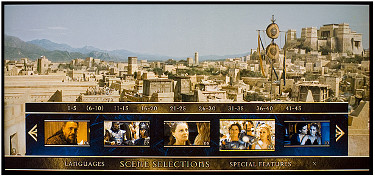 |
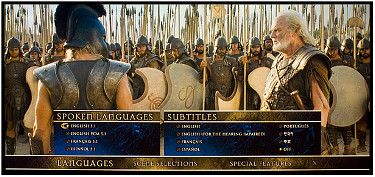 |
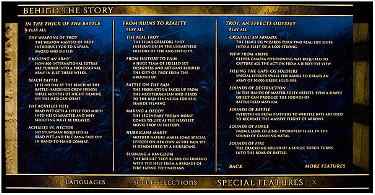 |
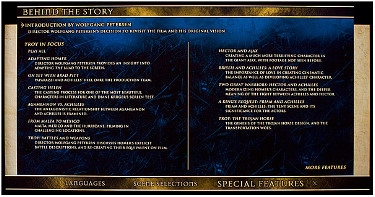 |
|
|
|
Recommendation: 8
There will be those who complain that this movie doesn't represent history, or at least what we know of it - not least by compressing the events of years into days. To those I say: If you go to see a movie like Troy expecting authenticity, you're a braver man than I. Recommended.
Leonard Norwitz
LensViews
September 30th, 2007
June 2010

